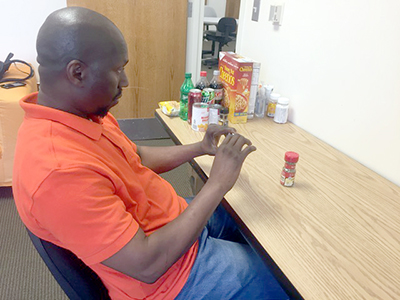 I am blind, a father of three daughters, a non-traditional student, and a senior at University of Maryland (UMD), College Park majoring in information science at the UMD iSchool hoping to specialize in human-computer interaction in graduate studies. I value education not only in the practical sense but also for how it shapes me as a person and allows me to contribute to our society.
I am blind, a father of three daughters, a non-traditional student, and a senior at University of Maryland (UMD), College Park majoring in information science at the UMD iSchool hoping to specialize in human-computer interaction in graduate studies. I value education not only in the practical sense but also for how it shapes me as a person and allows me to contribute to our society.
This summer, I participated in the Distributed Research Experiences for Undergraduates (DREU) program, a summer internship program supporting female and underrepresented students. I found out about this opportunity from Dr. Hernisa Kacorri, an Assistant Professor at UMD. I was interested in her research on accessibility and wanted to work with her over the summer. After expressing my interest, she invited me to join her research lab, the Intelligent Assistive Machines (IAM) Lab, and she directed me to AccessComputing.
This project is very close to my heart as it allows me to contribute to novel assistive technologies that can improve the lives of people with visual impairments. It was also a fun project that gave me the opportunity to interact with graduate students and learn how to conduct research.
My task involved helping with the design and implementation of the data collection process that will serve as a benchmark for our machine learning algorithms. This involved engineering the stimuli and all possible variables for photo taking of everyday objects by blind users. I contributed to the first dataset that is currently being replicated. This dataset plays an important role in the project as it will be used to train and test computer vision models to be incorporated in a wearable or mobile device as a teachable objection application for blind users. Specifically, blind participants will be training the mobile application with snapshots of object of interest and can provide custom labels as well as object descriptions through audio.
Prior studies show that there are many benefits for people who are blind and visually impaired living in their own homes rather than assisted living facilities. We are hoping that the assistive technologies from this project will help in this direction.
I had an awesome experience working as a team member of such a diverse group. Working with graduate students and hearing their stories post-undergrad was very rewarding and eye-opening. It was also a great networking experience as I attended research talks and got to discuss with research visitors about their work. Specifically, I would like to thank Dr. Kacorri for setting up a meeting with Ali Abdolrahmani. Ali was the first blind Ph.D. student that I have met. Not only were our discussion fruitful, but also through him I got introduced to an entire network of blind researchers.
I had an excellent time working at the IAM Lab. I owe this to many people, including AccessComputing. This alliance has helped me in so many ways, and I would recommend any fellow student who is blind or visually impaired to join them.
Also, finding a reader or scribe right before the summer is hard. Students often leave for summer vacations or internships. I would recommend reaching out early on.
Being able to do what I love for an entire summer has been a priceless experience. Through this program, I learned technical skills such as programming in HTML and LaTeX as well as analytical thinking, reading scholarly articles, and experimental design processes.
The DREU internship program has helped me accomplish my goals in gaining research experience and pursuing research opportunities for future graduate studies. And why stop at a master’s degree? Initiatives like AccessComputing empower students like me to dream further and leverage their life experiences to make a better world. Hopefully, next time you hear from me, I will be a Ph.D. student.